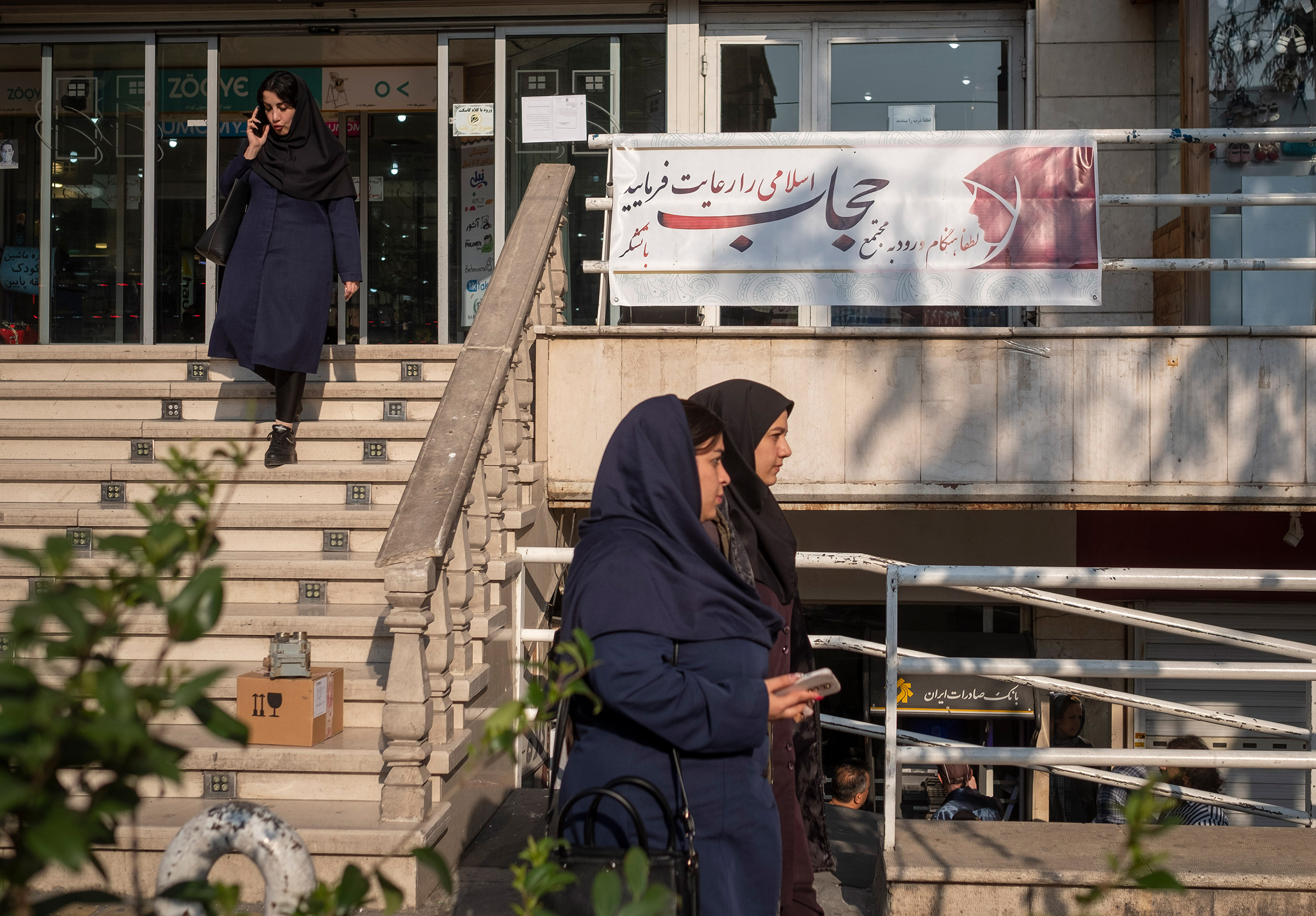
Iran’s so-called “morality police” is resuming patrols to enforce the country’s strict hijab rules, after largely pausing its activities for 10 months following mass protests over the killing of 21-year-old Mahsa Amini last September while she was in police custody. Amini had been detained for allegedly wearing “improper” hijab prior to her arrest.
On Sunday, Saeid Montazeralmahdi, a spokesperson for Faraja, Iran’s law enforcement body, confirmed that the morality police had resumed its street patrols, the state-run Mizan news agency reported. Officers will first issue a warning to any woman breaking the country’s hijab rules, he said, followed by legal action including arrests and being taken to re-education facilities for “those who continue to disregard the consequences of deviating from dress norms.”
Firoozeh Kashani-Sabet, a scholar of Iranian and Middle Eastern history at the University of Pennsylvania, says that it is “unsurprising” that the morality police are returning to the streets.
“The hijab laws have become synonymous with the politics of the Islamic Republic,” she tells TIME, adding that it is “not easy for the Islamic Republic to back away from one of its major policies that serves as a symbol of its power.”
More from TIME
Iran’s morality police has existed in various forms since the 1979 Islamic revolution, but the current version, formally known as Gasht-e Ershad (“Guidance Patrol”), has been in place since 2006.
Following Amini’s death last year, many Iranian women began defying the morality police by refusing to wear the compulsory hijab altogether, while some even burned their headscarves as they chanted “woman, life, liberty” at demonstrations. The morality police remained largely absent during this time, despite Islamic hardliners increasingly demanding that the patrols be resumed.
The protests have posed one of the biggest challenges to Supreme Leader Ali Khamenei’s rule and has been met with a fierce crackdown by police and security services. At least 500 protestors have died since the unrest began, according to a January report from the U.S.-based Human Rights Activists News Agency.
Activists say the government’s latest announcement appears timed ahead of the one-year anniversary of Amini’s death and the women-led protests. “The Islamic Republic is scared and knows that if women remove the hijab, they will feel empowered to lead another uprising in the wake of the one-year anniversary of Mahsa Amini,” says Masih Alinejad, an Iranian activist and journalist.
Read More: Iranian Dissident Masih Alinejad Won’t Be Silenced
In April, the Iranian government deployed surveillance cameras to identify and penalize women violating the country’s hijab laws. According to Reuters, women who were identified would receive a “warning about the consequences.” The police announcement about the measure also urged businesses to “seriously monitor the observance of societal norms with their diligent inspections.”
Since the demonstrations began, many women, including high-profile actresses and athletes, have been summoned or received sentences by authorities for removing their headscarves. One court sentenced a woman to the ritual washing of corpses, while another handed down a punishment of 270 hours of cleaning government buildings. In May, Iranian actress Azadeh Samadi was sentenced to a six-month social media ban and mandated therapy to cure her of an “anti-social personality sickness” after appearing at a funeral without a headscarf.
Alinejad says the government’s use of different tactics to resume and impose hijab laws had so far been ineffective. “If you walk these days on the street of any town in Iran, you will be surprised by how many women walking unveiled and protesting mandatory hijab,” she says.
But the latest crackdown attempt will nevertheless have larger consequences for women’s rights in Iran, says Kashani-Sabet. “The intimidation and uncertainty will serve as deterrents to those who may want to remove the veil but are afraid to do so—as intended—but it will also have the effect of enforcing a culture that normalizes aggression against women,” she says.
More Must-Reads from TIME
- Caitlin Clark Is TIME's 2024 Athlete of the Year
- Where Trump 2.0 Will Differ From 1.0
- Is Intermittent Fasting Good or Bad for You?
- The 100 Must-Read Books of 2024
- Column: If Optimism Feels Ridiculous Now, Try Hope
- The Future of Climate Action Is Trade Policy
- FX’s Say Nothing Is the Must-Watch Political Thriller of 2024
- Merle Bombardieri Is Helping People Make the Baby Decision
Write to Astha Rajvanshi at astha.rajvanshi@time.com